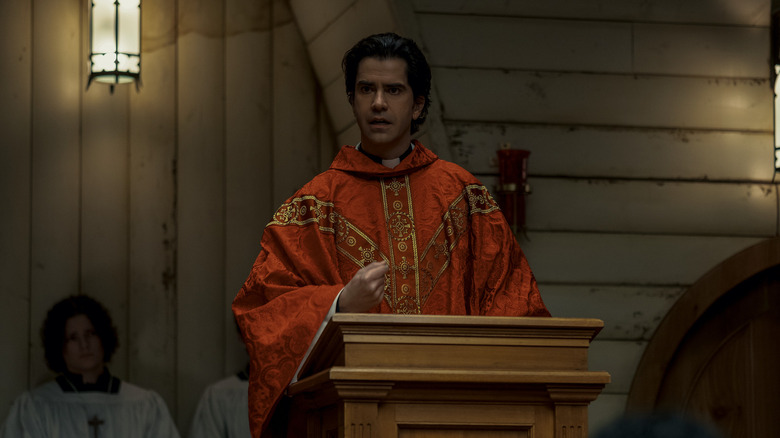
"What happens when you die?"
It's a question asked multiple times in "Midnight Mass," the talky, heartbreaking, fascinating new bit of religious horror from creator/writer/director Mike Flanagan. Flanagan has said this is his most personal project yet, something he's been working towards for his entire career, and it shows – he's poured his heart and soul into this thing, which is both a blessing and a hindrance. Watching "Midnight Mass," you get the sense that Flanagan has so much he wants to say, and he puts all of those words into the mouths of his characters, many of whom go off on extremely long existential monologues. The monologuing can get exhausting and a touch distracting – no one talks like this.
And yet, it ultimately works because "Midnight Mass" is so heartfelt. It burns with energy and life. And death. Death is the all-consuming factor here; a thing to be feared and awed at. "Midnight Mass" isn't just asking, "What happens when you die?" It's also asking: "What if you could live forever?"
Religion And Horror
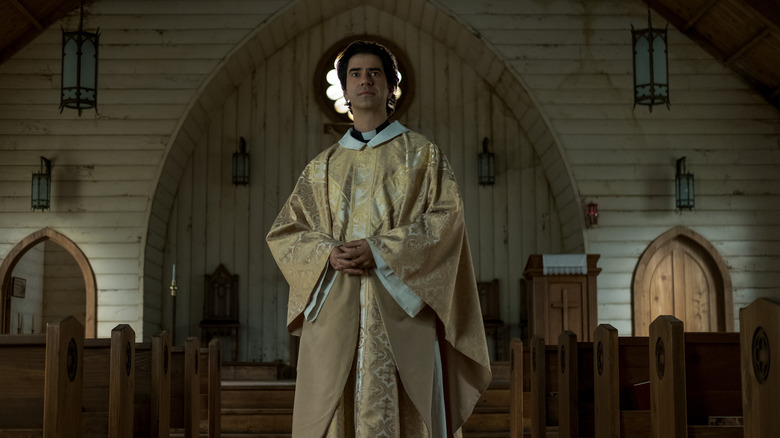
Religion and horror often go hand in hand, especially Christianity. Christianity and its various factions – especially Catholicism – has proven to be fertile ground for horror, be it the Antichrist fears of "Rosemary's Baby" or "The Omen," to the demonic possession of "The Exorcist." There are horror titles that draw from non-Christian sources, but Christianity and Catholicism usually get the most attention, and it's easy to see why – these are faiths loaded with stories of ghosts, demons, and the eventual end of the world. The Book of Revelation is one of the oldest horror stories on record, a tale of multi-headed monsters and all-consuming fires. Only the righteous will be saved. But who gets to decide who is truly righteous? And who is doomed to burn forever?
A lot of religious-based horror is, for lack of a better word, cheap. Filmmakers simply use iconography – upside-down crosses are a big example of this – and don't put much more thought into it. But "Midnight Mass" has a lot more on its mind. Flanagan, a confirmed former altar boy, has actual knowledge of the faith to draw on. It would've been very easy for Flanagan to make a bit of religious horror where the religious figures are nothing more than one-dimensional monsters; evil creeps in holy garb. But religion is not a mere plot device here; the characters here, be they good or evil, are committed to their faith. They think they're justified in their actions. They think God has blessed them. And that's ten times more terrifying than a con artist twisting faith for personal gain.
There's a nefarious priest at the center of "Midnight Mass," a character played brilliantly by Hamish Linklater in what should be a star-making turn. It would've been very easy for Flanagan to make Linklater's character a phony; a fraud; someone who is manipulating a small community of the faithful for his own betterment. But that's not what's going on here. As wrong, and potentially deadly, as the priest may be, he truly believes in what he's doing. He wants to be a savior.
A Vampire Story
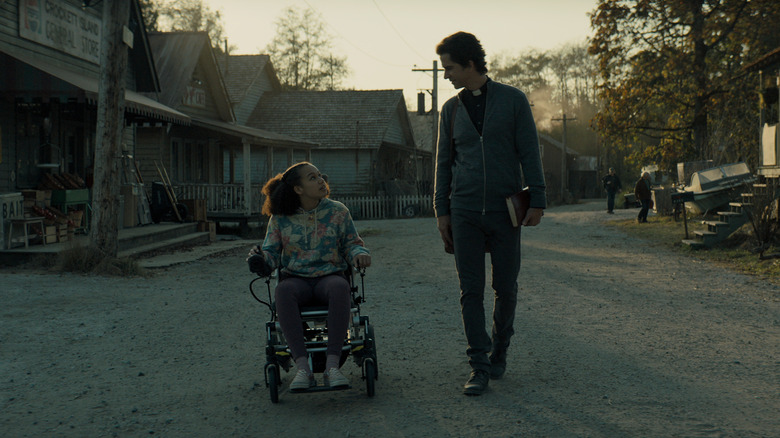
"Midnight Mass" is a vampire story. The series downplayed this element in the marketing, which is to its benefit, because the show takes its time getting to the blood sucking. But Flanagan has cleverly combined elements of vampiric folklore with elements of faith – after all, when church-goers partake in communion, they're symbolically drinking a cup of blood. Flanagan is a Stephen King fan, and he's also drawing on King's work here, especially "Salem's Lot," which seems like a major influence on "Midnight Mass." Like "Salem's Lot," this is a story of a small community that comes apart, where literally every resident is somehow touched by the horrors that unfold.
The setting is Crockett Island, an extremely tiny community close to drawing its last breath. An oil spill in the past has devastated the inhabitants of the island, many of whom work as fisherman. People have packed up and moved away, leaving abandoned homes to rot in the salt air. And after four years in prison, island resident Riley Flynn (Zach Gilford) is returning home. Riley's prison term was due to a drunk driving accident that took the life of a young girl – a young girl who still haunts Riley, appearing to him in her battered, bloody form whenever he tries to sleep at night.
This isn't a warm homecoming. Riley returns to live with his parents, both of them devout church goers. Riley's mother (Kristin Lehman) is happy to have him home, but she also expects him to act and behave exactly as he did before he went away to prison. Riley's father (frequent Flanagan player Henry Thomas), however, is cold and distant towards his son. This isn't exactly new – they clearly never had a great relationship. But when Riley tells his parents he doesn't intend to go to weekly church services with them now that he's home, his father won't hear of it. He angrily tells Riley he has no choice – he must accompany them to church.
The Cup Of Eternal Life
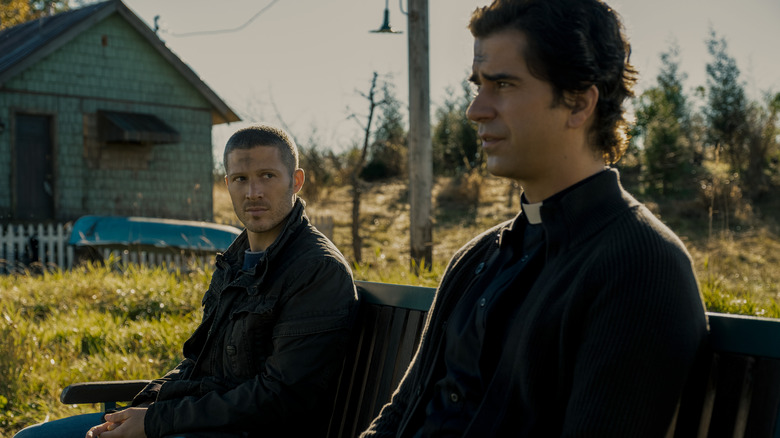
The church, St. Patrick's, is at the center of seemingly everything on the island. Not everyone on Crockett is a church-goer, but it sure seems like the majority of folks are. That includes Erin Green (Kate Siegel), Riley's childhood girlfriend who has also recently returned to the island after years away. And then there's Bev Keane (Samantha Sloyan), a hateful zealot who seems to have a tight grip on the community. She's not an elected official and she has no real power, and yet, the islanders must abide her will due to how influential she's become in the community.
The head of the church is the elderly Monsignor Pruitt who has been running the show since Riley was a child. But when Riley and his family attend church they're in for a surprise: the Monsignor is gone, having taken ill after a trip overseas. In his place is a young stranger, Father Paul Hill (Linklater). It's here where Flanagan makes a bit of a mistake – we see images of the monsignor, and it's pretty clear that the images show Linklater made up as an older man. Indeed, many younger actors here are slathered in make-up to resemble old people, most notably Alex Essoe, who is buried under old age make-up when we first meet her, playing Mildred Gunning, a woman suffering from dementia, and mother to the island's only doctor, Dr. Sarah Gunning (Annabeth Gish).
I suppose if you're unfamiliar with these actors in general you might not catch the deception at first, but it became abundantly clear to me from the get-go that Flanagan was up to something with this heavy use of old age make-up. Sure enough, as the series progresses, a lot of these elderly characters suddenly start to look much younger. Why? Because they're drinking from the cup of eternal life – in the form of vampiric blood.
A Miracle
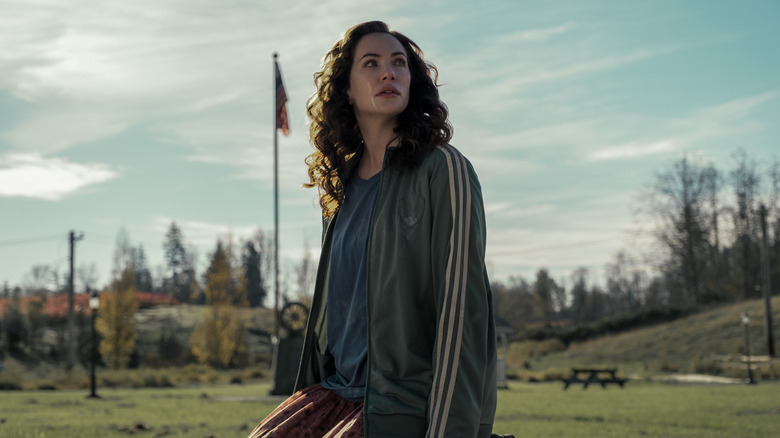
We eventually learn that the elderly Pruitt, visiting Damascus, wandered into an ancient ruin to take cover from a sandstorm. Within this structure he encountered a winged humanoid creature that he immediately assumes is an angel. But it would be more accurate to describe this thing as a vampire; an ancient, monstrous vampire that's nothing like the suave, formally dressed vamps we usually see in movies. The creature pounces on Pruitt and forces the priest to drink its blood. The result: Pruitt is de-aged to his younger self, and he concocts a plan to bring the "angel" back to Crockett Island so he can share this healing, youth-bringing blood.
We can immediately see the folly of such an idea, but Pruitt AKA Father Paul genuinely believes in what he's doing. He wants to save the people of the island. He wants them to be washed in the blood of the lamb; to be made pure, and holy, and closer to God. The key to making all of this work is Linklater's performance, which is so nuanced, so natural-seeming that it becomes disarming. The actor has a hypnotic voice and he almost always speaks in a calm, soft manner – something that the show uses to its advantage later when the priest suddenly explodes in a fit of rage, shouting at the top of his lungs.
As the faithful of Crockett Island partake in communion they are unwittingly drinking that powerful vampire blood, and it's transforming them. They grow younger. They grow stronger. And in some cases, they experience tragedy. Erin, who is pregnant when we first meet her, unexpectedly miscarries. In fact, a medical exam reveals that it looks like she was never pregnant to begin with, even though we know that's not true.
Meanwhile, the outsiders – those who don't attend the church – are left out of the loop. Outsiders like the island's seemingly only law enforcement official, Sheriff Hassan (Rahul Kohli), a Muslim man that the racist, hateful Bev eyes suspiciously whenever she crosses his path. Hassan grows alarmed when his son Ali (Rahul Abburi), who has been raised in the Muslim faith, suddenly expresses interest in attending St. Patrick's.
At first, the changes on the island are subtle and easy to ignore. But that becomes impossible when those attending church witness a miracle: Father Paul commands Leeza Scarborough (Annarah Cymone), a young girl who uses a wheelchair, to walk – and she does. It's the cursed blood that heals Leeza, but no one knows that; they simply think God has used Father Paul to perform a miracle. And perhaps that's exactly what happens here.
"Midnight Mass" asks a lot of questions, and one of those questions is: who is to say all that's happening here isn't the will of God? Maybe this is exactly what God wants if he even exists. Or maybe not.
Billions Of Other Places
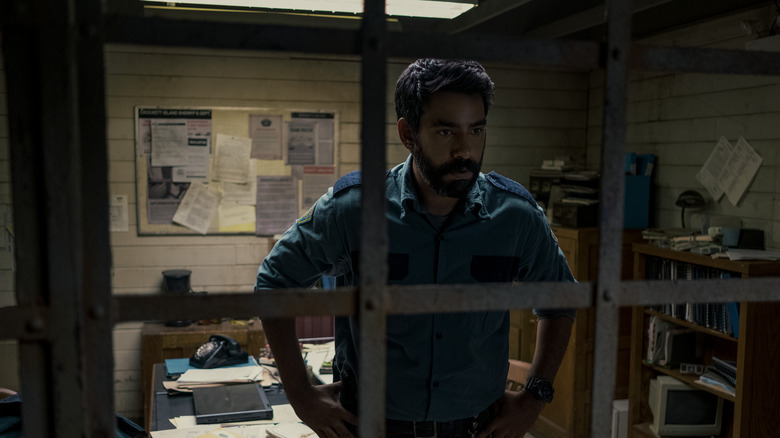
Riley has his doubts, and those doubts lead to the show's most powerful scene. In the wake of losing her baby, death is on Erin's mind, and she asks Riley what he thinks happens when he dies. A monologue begins, where Riley talks about how his body will shut down and eventually he'll be nothing – and yet, while there's no talk of God here, there's something comforting about his words. Death, according to Riley, will be the "dream to end all dreams." And eventually, when he completely ceases to live, the microbes that still exist within him will continue to live, to feast on him. And give him some sort of purpose, even in death.
"Electricity disperses from my brain. It's just dead tissue," Riley says. "And all the other little things that make me up – the microbes and bacteria and a billion other little things on my eyelashes and my hair and my mouth, and in my skin, and in my gut, and everywhere else, they just keep on living. And eating. And serving a purpose. Feeding life. And I'm broken apart ... And I'm billions of other places."
Erin, the believer, has an alternate theory – a theory about coming home. About being united with those we lost. And she speaks of her unborn child. "And she's happy, nothing but joy for all eternity," Erin says. "And she's loved. She is known. And that's what we mean when we say heaven. Not mansions, or rivers of diamonds, or fluffy clouds or angel wings. You are loved and you aren't alone. That is God."
The scene is simply two people talking as Flanagan slowly pushes the camera in on their faces, all while a haunting piano version of "Nearer, My God, to Thee" plays. And yet it packs the biggest punch of the series. It's devastating and emotional, to the point where it wrecked me. I actually had to pause the show to get myself under control. Siegel and Gilford sell their words so convincingly, so beautifully, that it's overwhelming to the extreme. It's two sides of the coin – death for those with faith, and those without it.
And both versions are lovely in their own inescapable way. This is Flanagan's true power. He understands the horror genre, and he's able to conjure up scary imagery (although I have to say "Midnight Mass" is never quite as scary as it could be). But it's the emotional heft that he truly excels at. You could argue that scenes like this are needlessly talky and even uncinematic. And you wouldn't be wrong, exactly. And yet, there's a unique power in sitting back and listening to two people have a conversation like this. A conversation that burrows its way into your heart and soul and mind, and leaves you emotionally shipwrecked.
What Happens When You Die?
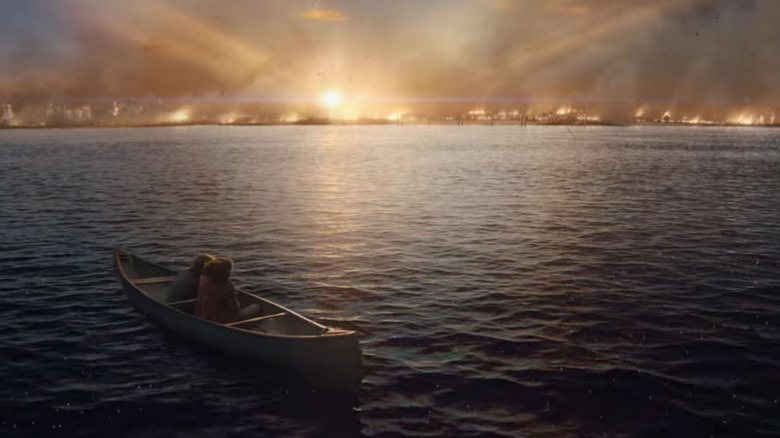
As "Midnight Mass" works its way to its conclusion, more horrors rear their ugly heads. Riley ends up fully transformed into a vampire – you can drink the vampire blood and remain mostly human, but if your body dies after consuming the blood, you'll be reborn as a member of the undead. Father Paul sees this as a gift and wants Riley to help him spread the good news, but Riley wants nothing to do with this. Because to survive as a vampire you must feed – you must kill. And rather than do so, Riley sacrifices himself, burning up as the sun rises while Erin watches in horror.
But now clued into what's truly going on here, Erin teams with others – Sheriff Hassan and Dr. Gunning – to save the island. But there will be no true salvation. In one of the show's most chilling sequences, the churchgoers take part in a Jonestown-like massacre where they willfully drink poison in order to be reborn as vampires. Father Paul thinks this will be a moment of triumph, but it doesn't go according to plan, and chaos soon sets in, giving way to slaughter.
Before the night is out, almost every single person on the island is either dead or transformed into a vampire. And the few survivors don't fair much better. Erin, Sheriff Hassan, and Dr. Gunning all end up eventually dying. Father Paul realizes his mistakes. And the transformed islanders have come to see themselves as monsters. It doesn't help matter that Bev, in true zealous fashion, orders every structure on the island burned – a plan that backfires when the undead soon realize they'll have nowhere to run once the sun rises.
And the sun does rise. And those who have been transformed burn up in a glorious, purifying fire. The island has finally died along with its residents. The only two survivors are Leeza, who is suddenly unable to walk again, and Riley's younger brother (Igby Rigney), who watch the island burn from a safe distance. It's a haunting ending overall; an ending that's somehow both hopeful and hopeless at the same exact moment. Faith can be a good thing, but it can also corrupt. There are those who can take religion and bend it to their will, and even if they have what they think are nobel intentions, it can all go horribly wrong. And those caught in the middle of it all will be left asking one question: "What happens when you die?"
Read this next: Midnight Mass Review: Keep The Faith And Follow Mike Flanagan Down A Haunting Rabbit Hole
The post Midnight Mass Spoiler Review: Mike Flanagan's New Horror Series is Devastating and Often Brilliant appeared first on /Film.
from /Film https://ift.tt/3AOiVUD
via IFTTT
Comments
Post a Comment